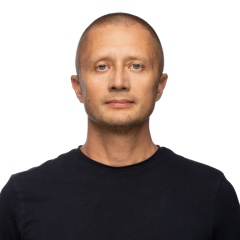Мысли вслух. Абсолютная истина.
Абсолютная истина в том, что абсолютной истины не существует. Эта фраза не нова, многие уже ее часто слышали. Данная истина прекрасно работает по отношению ко всему, за исключением самой себя. Применить ее смысл к самой себе не получается. Так как после этого данное утверждение становится ложным. Интересное наблюдение) С этого момента поподробнее…
Получается фраза одновременно противоречит сама себе и в тоже время истинна! Противоречие заключается в том, что фраза утверждающая, что абсолютных истин нет, сама не может быть истинной, если она окажется истинной, то посыл заложенный в ней будет ложным(Т.к. возникнет одна абсолютная истина).
Значит для полной истинности этой фразе не хватает такого утверждения:
Нет Абсолютной истины в том, что Абсолютной истины не существует. Это жизнеспособно для самой этой фразы, но не истинно для всех других истин, так как мы уже выяснили, что все другие истины не являются Абсолютными. Т.е. если мы возьмёмся перебирать все другие истины, то выясним, что все они не абсолютны, а обобщением этого перебора будет как раз вывод о том что Абсолютных истин нет. И тут мы плавно возвращаемся к первоначальной формулировке: Абсолютная истина в том, что абсолютной истины не существует. Но, как только мы к ней пришли, опять обнаруживаем, что она не истинна(по отношению к самой себе) И так мы вынуждены опять прибегнуть ко второй фразе-антиподу. И так опять и опять и опять…до бесконечности. Иначе смысловая целостность будет потеряна.
Следовательно существование смысла этой фразы без противоречий возможно только в "движении" от ее утвердительной формы к отрицательной. Интересное проявление дуализма.
Еще можно рассмотреть эту фразу немного по-другому. Так как в этой фразе говорится о самой себе(Абсолютная истина как бы дает себе определение), можно приравнять "Абсолютная истина" просто к "Я" и посмотреть что получится:
Я в том, что меня не существует(моя суть в том, что меня не существует. Как бы говорит нам "Абсолютная истина") О, как интересно звучит. Закономерно возникает сразу вопрос, кто этот Я, которого не существует? Точнее как он "говорит" если его не существует? Ну и прибегнем к фразе-антиподу:
Не Я в том, что меня не существует(не верно то, что меня не существует отдается эхом)
Интересный поворот. Продолжение следует...
Абсолютная истина в том, что абсолютной истины не существует. Эта фраза не нова, многие уже ее часто слышали. Данная истина прекрасно работает по отношению ко всему, за исключением самой себя. Применить ее смысл к самой себе не получается. Так как после этого данное утверждение становится ложным. Интересное наблюдение) С этого момента поподробнее…
Получается фраза одновременно противоречит сама себе и в тоже время истинна! Противоречие заключается в том, что фраза утверждающая, что абсолютных истин нет, сама не может быть истинной, если она окажется истинной, то посыл заложенный в ней будет ложным(Т.к. возникнет одна абсолютная истина).
Значит для полной истинности этой фразе не хватает такого утверждения:
Нет Абсолютной истины в том, что Абсолютной истины не существует. Это жизнеспособно для самой этой фразы, но не истинно для всех других истин, так как мы уже выяснили, что все другие истины не являются Абсолютными. Т.е. если мы возьмёмся перебирать все другие истины, то выясним, что все они не абсолютны, а обобщением этого перебора будет как раз вывод о том что Абсолютных истин нет. И тут мы плавно возвращаемся к первоначальной формулировке: Абсолютная истина в том, что абсолютной истины не существует. Но, как только мы к ней пришли, опять обнаруживаем, что она не истинна(по отношению к самой себе) И так мы вынуждены опять прибегнуть ко второй фразе-антиподу. И так опять и опять и опять…до бесконечности. Иначе смысловая целостность будет потеряна.
Следовательно существование смысла этой фразы без противоречий возможно только в "движении" от ее утвердительной формы к отрицательной. Интересное проявление дуализма.
Еще можно рассмотреть эту фразу немного по-другому. Так как в этой фразе говорится о самой себе(Абсолютная истина как бы дает себе определение), можно приравнять "Абсолютная истина" просто к "Я" и посмотреть что получится:
Я в том, что меня не существует(моя суть в том, что меня не существует. Как бы говорит нам "Абсолютная истина") О, как интересно звучит. Закономерно возникает сразу вопрос, кто этот Я, которого не существует? Точнее как он "говорит" если его не существует? Ну и прибегнем к фразе-антиподу:
Не Я в том, что меня не существует(не верно то, что меня не существует отдается эхом)
Интересный поворот. Продолжение следует...
Thinking out loud. Absolute truth.
The absolute truth is that there is no absolute truth. This phrase is not new, many have already heard it often. This truth works great for everything except itself. It is impossible to apply its meaning to itself. Because after that this statement becomes false. Interesting observation) From now on, in more detail ...
It turns out that the phrase contradicts itself and at the same time is true! The contradiction lies in the fact that a phrase asserting that there are no absolute truths itself cannot be true, if it turns out to be true, then the message inherent in it will be false (because one absolute truth will arise).
This means that for complete truth this phrase lacks such a statement:
There is no Absolute Truth that there is no Absolute Truth. This is viable for the phrase itself, but not true for all other truths, since we have already found out that all other truths are not Absolute. Those. if we undertake to sort out all other truths, then we will find out that all of them are not absolute, and the generalization of this search will be just the conclusion that there are no Absolute truths. And here we smoothly return to the original formulation: The absolute truth is that there is no absolute truth. But, as soon as we come to it, we again find that it is not true (in relation to itself) And so we are forced to resort again to the second phrase-antipode. And so again and again and again ... ad infinitum. Otherwise, semantic integrity will be lost.
Consequently, the existence of the meaning of this phrase without contradictions is possible only in the "movement" from its affirmative form to its negative. An interesting manifestation of dualism.
You can also consider this phrase a little differently. Since this phrase speaks about itself (the Absolute Truth, as it were, gives itself a definition), you can equate the "Absolute Truth" simply with "I" and see what happens:
I am that I do not exist (my essence is that I do not exist. As if the "Absolute Truth" tells us) Oh, how interesting it sounds. Naturally, the question immediately arises, who is this I, which does not exist? More precisely, how does he "speak" if he does not exist? Well, let's resort to the antipode phrase:
I am not that I do not exist (it is not true that I do not exist echoes)
An interesting twist. To be continued...
The absolute truth is that there is no absolute truth. This phrase is not new, many have already heard it often. This truth works great for everything except itself. It is impossible to apply its meaning to itself. Because after that this statement becomes false. Interesting observation) From now on, in more detail ...
It turns out that the phrase contradicts itself and at the same time is true! The contradiction lies in the fact that a phrase asserting that there are no absolute truths itself cannot be true, if it turns out to be true, then the message inherent in it will be false (because one absolute truth will arise).
This means that for complete truth this phrase lacks such a statement:
There is no Absolute Truth that there is no Absolute Truth. This is viable for the phrase itself, but not true for all other truths, since we have already found out that all other truths are not Absolute. Those. if we undertake to sort out all other truths, then we will find out that all of them are not absolute, and the generalization of this search will be just the conclusion that there are no Absolute truths. And here we smoothly return to the original formulation: The absolute truth is that there is no absolute truth. But, as soon as we come to it, we again find that it is not true (in relation to itself) And so we are forced to resort again to the second phrase-antipode. And so again and again and again ... ad infinitum. Otherwise, semantic integrity will be lost.
Consequently, the existence of the meaning of this phrase without contradictions is possible only in the "movement" from its affirmative form to its negative. An interesting manifestation of dualism.
You can also consider this phrase a little differently. Since this phrase speaks about itself (the Absolute Truth, as it were, gives itself a definition), you can equate the "Absolute Truth" simply with "I" and see what happens:
I am that I do not exist (my essence is that I do not exist. As if the "Absolute Truth" tells us) Oh, how interesting it sounds. Naturally, the question immediately arises, who is this I, which does not exist? More precisely, how does he "speak" if he does not exist? Well, let's resort to the antipode phrase:
I am not that I do not exist (it is not true that I do not exist echoes)
An interesting twist. To be continued...

У записи 4 лайков,
0 репостов.
0 репостов.
Эту запись оставил(а) на своей стене Сергей Александрович
























